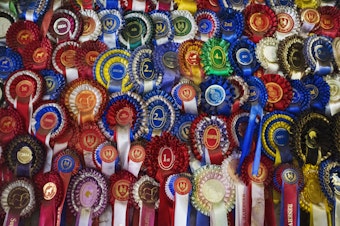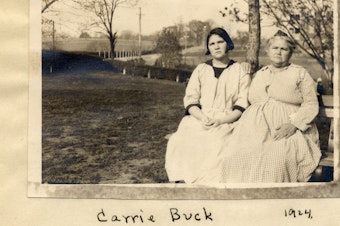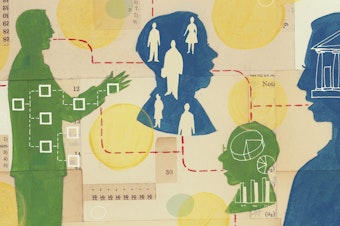Hidden Brain
Hidden Brain helps curious people understand the world – and themselves. Using science and storytelling, Hidden Brain reveals the unconscious patterns that drive human behavior, and the biases that shape our choices.
Sponsored
Episodes
-

Never Go To Vegas
All social classes have unspoken rules. From A-list celebrities to teachers, doctors, lawyers, and journalists — there are social norms that govern us, whether we realize it or not. This week on Hidden Brain, we look celebrity culture, as well as another elite group: the yoga-loving, Whole Foods-shopping, highly-educated people whom one researcher calls the new "aspirational class." This episode is from December 2017.
-

Love, Sex, And Robots
From stone statues to silicone works of art, we have long sought solace and sex from inanimate objects. Time and technology have perfected the artificial lover: today we have life-size silicone love dolls so finely crafted they feel like works of art. Now, with the help of robotics and artificial intelligence, these dolls are becoming even more like humans. This week we talk with researcher Kate Devlin about the history of the artificial lover, and consider what love and sex look like in the age of robots.
-

For Sale, By Owner: The Psychology Of Repugnant Transactions
You own your body. So should you be able to sell parts of it? This week, we explore the concept of "repugnant transactions" with the man who coined the term, Nobel Prize- winning economist Al Roth. He says repugnant transactions can range from selling organs to poorly-planned gift exchanges — and what's repugnant in one place and time is often not repugnant in another.
-

Better Than Cash: How Awards Can Shape Our Behavior
Our modern world is saturated with awards. From elementary school classrooms to Hollywood to the hallways of academia, there's no shortage of prizes — and people who covet them. Yet we rarely stop to ask, do they work? We pose that question to economist Bruno Frey, who argues that awards can have a powerful, positive effect on our behavior — but only if they're designed well.
-

Emma, Carrie, Vivian: How A Family Became A Test Case For Forced Sterilizations
In 1924, a 17-year-old girl was admitted to the Virginia State Colony for Epileptics and Feebleminded. The superintendent of the colony classified her as "feeble-minded of the lowest grade, moron class." With that designation, this girl, Carrie Buck, was set on a path she didn't choose. What happened next laid the foundation for the forced sterilization of tens of thousands of people. This week, we revisit a 2018 episode about the eugenics movement and one of the most tragic social experiments in American history.
-

Close Enough: The Lure Of Living Through Others
Today, more and more of us are living through the people on our screens and in our headphones. It's a world just beyond our reach, where we can get the ocean without the seaweed and sunsets without clouds. Where we can experience love without the risk of rejection. It's not real, but for many of us, it's close enough. This week, we explore the dangers, and the delights, of living vicariously.
-

One Head, Two Brains: How The Brain's Hemispheres Shape The World We See
This week, we search for the answer to a deceptively simple question: why is the brain divided? Psychiatrist Iain McGilchrist explains why popular distinctions between the "left brain" and "right brain" aren't supported by research. He argues that one hemisphere has come to shape Western society — to our detriment. For more information about this episode, please visit https://n.pr/2SxITco
-

Rewinding & Rewriting: The Alternate Universes In Our Heads
All of us are time travelers. We go back in history to turning points in our lives, and imagine how things could have turned out differently. Psychologists refer to this as "counterfactual thinking." This week on Hidden Brain, we look at why some events prompt these "What if?" questions, while others do not. This episode originally aired in May 2018.
-

How Science Spreads: Smallpox, Stomach Ulcers, And 'The Vegetable Lamb Of Tartary'
We like to think that science evolves in a way that is...rational. But this isn't always the case. This week, we look at how information and misinformation spread in the world of science, and why evidence is often not enough to convince others of the truth. We talk with philosopher and mathematician Cailin O'Connor. For more information about this episode, please visit https://n.pr/2FO4SEW
-

The Best Medicine: Decoding The Hidden Meanings Of Laughter
If you listen closely to giggles, guffaws, and polite chuckles, you can discern a huge amount of information about people and their relationships with each other. This week, we talk with neuroscientist Sophie Scott about the many shades of laughter, from cackles of delight among close friends to the "canned" mirth of TV laugh tracks. You can find more about the research discussed in this episode here: https://n.pr/2RORlDs
-

The Cowboy Philosopher: A Tale Of Obsession, Scams, And Family
In 2009, an old man died in a California nursing home. His obituary included not just his given name, but a long list of the pseudonyms he'd been known to use. In this episode, we trace the life of Riley Shepard, a hillbilly musician, writer, small-time con man and, perhaps, a genius.
-
![caption: "Compassion is contagious," Professor Scott Plous says. "We talk about paying it forward; the idea that if you do something good for another person [...] it sets off a kind of chain reaction."](https://kuow-prod.imgix.net/store/996b606428a6cf457d90693ced40a6b7.jpeg?ixlib=rails-4.3.1&fit=crop&crop=faces&auto=format&w=340&h=226)
The Science of Compassion
The adage "be kind to others" is simple enough that even young children can understand it. But that doesn't mean adults always remember the importance of being kind or understand how compassion might affect them. This week, we look at the science of compassion, and why doing good things for others can make a big difference in your own life.